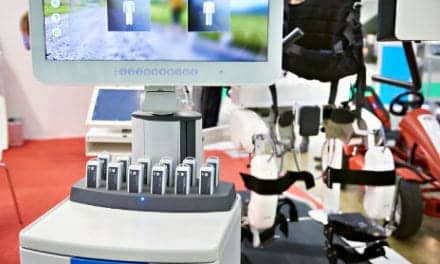The Wyss Institute for Biologically Inspired Engineering announces a collaboration with ReWalk Robotics Ltd to develop an assistive exosuit for use by stroke and multiple sclerosis patients.
The exosuit in development at Wyss Institute, located at Harvard University, differs from the ReWalk exoskeleton and others for spinal cord injury patients in that, rather than being rigid and used to provide structural support and large assistance for patients with extremely severe movement disabilities, it is lightweight, nonrestrictive, made from soft and wearable materials, and built for those who could move partially on their own, per a media release from Wyss Institute.
The soft exosuit transmits power to key joints of the legs via cable technologies powered with software and mechanics that are similar to the technologies used in the ReWalk system. The cables are connected to fabric-based designs that attach to the legs and foot, explains a media release from ReWalk Robotics.
Initial pilot studies with stroke patients conducted at Wyss Institute, in collaboration with faculty and researchers from Boston University, demonstrate the function of the softsuit exoskeleton technology.
ReWalk’s collaboration with the Wyss Institute will entail the continued development of lightweight designs to complete clinical studies, the pursuit of regulatory approvals, and the commercialization the soft exosuit on a global scale. The first commercial application is expected to be with stroke patients, then with multiple sclerosis patients, and then additional applications, the ReWalk release continues.
“This is a very exciting day for the soft exosuit technology,” said Conor Walsh, PhD, a core faculty member at the Wyss Institute, in the ReWalk release.
“ReWalk brings commercialization expertise and experience in the area of wearable robotics and complements our translation-focused research. Ultimately this agreement paves the way for this technology to make its way to patients,” adds Walsh, also the John L. Loeb Associate Professor of Engineering and Applied Sciences at Harvard John A. Paulson School of Engineering and Applied Sciences, and Founder of the Harvard Biodesign Lab.
“There is a great need in the health care system for lightweight, lower-cost wearable exoskeleton designs to support stroke patients, individuals diagnosed with multiple sclerosis, and senior citizens who require mechanical mobility assistance. This collaboration will help create the next generation of exoskeleton systems, making life-changing technology available to millions of consumers across a host of patient populations,” states Larry Jasinski, CEO of ReWalk, per the ReWalk Release.
[Source(s): Wyss Institute for Biologically Inspired Engineering at Harvard University, ReWalk Robotics Ltd, PR Newswire]




